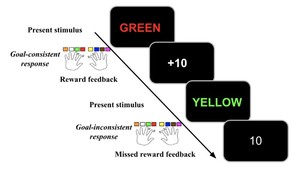Learning to Overexert Cognitive Control in a Stroop Task
2021
Article
re
How do people learn when to allocate how much cognitive control to which task? According to the Learned Value of Control (LVOC) model, people learn to predict the value of alternative control allocations from features of a given situation. This suggests that people may generalize the value of control learned in one situation to other situations with shared features, even when the demands for cognitive control are different. This makes the intriguing prediction that what a person learned in one setting could, under some circumstances, cause them to misestimate the need for, and potentially over-exert control in another setting, even if this harms their performance. To test this prediction, we had participants perform a novel variant of the Stroop task in which, on each trial, they could choose to either name the color (more control-demanding) or read the word (more automatic). However only one of these tasks was rewarded, it changed from trial to trial, and could be predicted by one or more of the stimulus features (the color and/or the word). Participants first learned colors that predicted the rewarded task. Then they learned words that predicted the rewarded task. In the third part of the experiment, we tested how these learned feature associations transferred to novel stimuli with some overlapping features. The stimulus-task-reward associations were designed so that for certain combinations of stimuli the transfer of learned feature associations would incorrectly predict that more highly rewarded task would be color naming, which would require the exertion of control, even though the actually rewarded task was word reading and therefore did not require the engagement of control. Our results demonstrated that participants over-exerted control for these stimuli, providing support for the feature-based learning mechanism described by the LVOC model.
| Author(s): | Laura Bustamante and Falk Lieder and Sebastian Musslick and Amitai Shenhav and Jonathan Cohen |
| Journal: | Cognitive, Affective, & Behavioral Neuroscience |
| Volume: | 21 |
| Pages: | 453--471 |
| Year: | 2021 |
| Month: | January |
| Department(s): | Rationality Enhancement |
| Bibtex Type: | Article (article) |
| Paper Type: | Journal |
| Digital: | True |
| DOI: | 10.3758/s13415-020-00845-x |
| Note: | Laura Bustamante and Falk Lieder contributed equally to this publication. |
| State: | Published |
| URL: | https://link.springer.com/article/10.3758/s13415-020-00845-x |
| Links: |
Learning to Overexert Cognitive Control in a Stroop Task
|
| Attachments: |
Learning to Overexert Cognitive Control in a Stroop Tas
|
|
BibTex @article{Bustamante2020Stroop,
title = {Learning to Overexert Cognitive Control in a Stroop Task},
author = {Bustamante, Laura and Lieder, Falk and Musslick, Sebastian and Shenhav, Amitai and Cohen, Jonathan},
journal = {Cognitive, Affective, & Behavioral Neuroscience},
volume = {21},
pages = {453--471},
month = jan,
year = {2021},
note = {Laura Bustamante and Falk Lieder contributed equally to this publication.},
doi = {10.3758/s13415-020-00845-x},
url = {https://link.springer.com/article/10.3758/s13415-020-00845-x},
month_numeric = {1}
}
|
|


